The legal AI software market is expected to quadruple in the next five years, as AI technology offers significant potential to help lawyers focus on higher-value tasks.1 Despite challenges such as biased forecasts and tracking changing regulations, there are many manual tasks within legal departments that can be automated. AI can effectively address these use cases, leading to time savings and cost reductions.
Explore legal AI use cases and real-life examples:
What are the typical legal AI use cases and real-life examples?
Document automation/ Contract drafting
Legal document automation can provide significant time savings (around 70%2 ) and prevent errors. With AI, companies can generate different types of legal documents for their clients instantly and proofread them to avoid any mistakes. These documents can include business contracts, non-disclosure agreements, wills, and trusts.
- You can learn more about legal document automation in our related article.
- For more about document automation in general, here is our in-depth guide.
Case study
Earthly transformed its contract drafting and management by adopting a legal platform that automates document drafting and centralizes legal documents in a secure data room. As a result, the firm was able to:
- Reduce the time from draft to completion to 30 minutes.
- Ensure a 90% cost savings on contracts.
- Streamline collaboration and version control.
- Enable quick access to necessary files.
- Reduce reliance on external legal counsel for hiring and sales contracts.3
Contract review
Creating business contracts is a time-consuming process where both sides’ lawyers need to manually review, edit, and exchange drafts numerous times. Gartner shares that in-house legal departments spend half of their time reviewing contracts. As it is uncertain when both sides agree on a particular contract, this process might cause delays in other related tasks.
AI can accelerate contract review processes by leveraging natural language processing (NLP) technologies, analyzing them, and defining the problematic parts. As manual contract review processes are prone to errors, AI can fix spelling mistakes and optimize content to provide shorter but more effective contracts.
Case study
Shoosmiths utilized a contract review platform to automate their contract review process. The platform analyzed complex agreements in about 3 minutes with 90% accuracy, compared to a qualified lawyer who would take 4 hours with an accuracy rate of 86%.4
Litigation prediction
AI can evaluate the riskiness of cases and predict court outcomes. As this assessment can help companies plan their litigation strategies, AI can determine the riskiness of cases and predict court outcomes. This assessment can provide fast-track settlement negotiations and minimize the number of cases that need actually to go to trial.
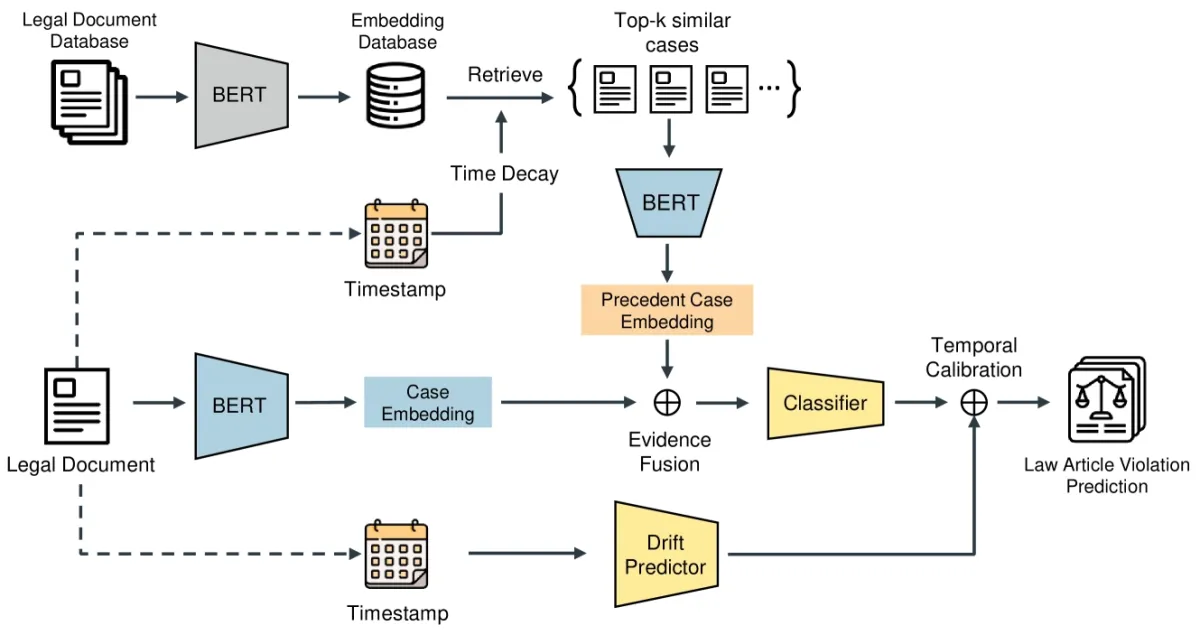
Legal analytics
Large companies will have lots of outstanding contracts, with different counterparties, across numerous divisions. Thus, it is challenging to be aware of all the details and commitments of the company. By using AI to analyze existing agreements, legal firms and departments can achieve valuable insights that would provide different teams to improve their processes:
- Sales: Companies can track when contracts are up for renewal and capitalize on revenue with upsell opportunities.
- Procurement: Companies can be aware of the details of existing agreements and renegotiate with clients when necessary.
- Compliance: Companies can easily monitor if they follow regulatory procedures.
- Finance: Companies are always ready for cases like mergers and acquisitions (M&A) and due diligence.
Case study
Outreach, a software development company, implemented a legal AI tool to overcome challenges like:
- Spending 1-2 hours daily to manage contract-related requests
- Inconsistent visibility
- Reporting challenges.
By integrating the tool with their existing systems like CRM, the firm could create a centralized repository for all post-signature contracts, which led to:
- Saving 5-10 hours per week on contract-related tasks.
- Improving tracking contract clauses and compliance through AI-powered search.
- Automating and accurate contract reporting cut time spent on report creation by 50%.
- Providing reliable, centralized contract data accessible to sales, legal, and marketing teams.
- Mitigating risks associated with missing or mismanaged contracts through a single source of truth.6
Legal research
Legal research is a manual process where mostly junior firm associates and young lawyers spend them to conduct research for different cases and understanding them accurately. AI can:
- scan through laws and regulations
- provide different legal opinions for cases
- inform legal departments with similar cases
This use case started to be more popular among legal companies, as Forbes shares that over 4,500 US law firms subscribe to Casetext for AI-driven legal research purposes today.
Case study
The Employment Law Center of Maryland adopted a legal research tool that extracts and analyzes data (see Figure 1), delivering unique insights and capabilities, enhancing their legal research and analysis.7
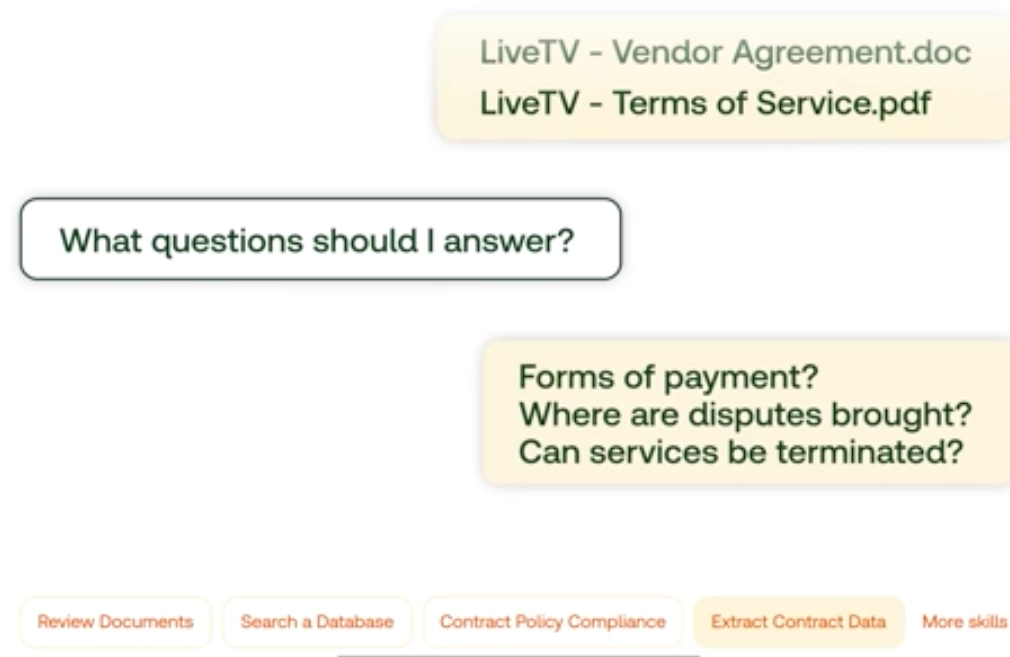
Intellectual property
Companies that have multiple brands to promote online need to monitor 30+ digital platforms to protect their trademarks. AI can handle tasks related to businesses’ intellectual property like invention disclosures, docketing, filing applications, valuing your IP portfolio, and budgeting. According to IBM, using AI can half the total time spent by lawyers for analyzing trademark search results.
Case study
Kyocera Document Solutions Japan Inc. adopted a legal AI platform to manage its extensive patent portfolio, resulting in:
- Unified patent and payment management within a single platform.
- Enhanced visibility and control over the patent portfolio.
- Streamlined workflows, improving operational efficiency.
- Real-time data visualization for informed decision-making.
- Strengthened IP management processes and optimized portfolio value.8
Electronic discovery
In legal departments, electronic discovery can account for as much as 70% of the cost of any legal action or lawsuit. AI can support businesses in electronic discovery processes to prevent them from unexpected issues.
For that, AI can process high volumes of data, create relationships with different information assets, and provide legal departments with insights to protect themselves. This will enable faster electronic discovery processes and reduce legal review costs.
Case study
Pillsbury Law faced difficulties with managing discovery across numerous clients and jurisdictions, handling large data volumes, and incurring high processing and hosting fees from external vendors. By implementing e-discovery tool, the firm could:
- Improved resource management with secure cloud deployment
- Achieved cost savings by 40-50% by processing and hosting data in a self-controlled cloud environment
- Enhanced review speed and accuracy by handling hundreds of cases and terabytes of data efficiently.9
Electronic billing
Managing legal expenditure is one of the automatable tasks that the majority of companies handle manually through spreadsheets. With AI, companies can reduce paper costs, decrease human-made errors, and achieve more accurate insights about their legal spending.
Case study
Lufthansa Group’s legal team aimed to increase control over legal spending and improve engagement with outside counsel. A major issue was the dissatisfaction with the existing billing software, which led to inefficiencies and communication breakdowns. The team adopted a AI-powered e-billing and matter management tool leading to results, such as:
- Implementing a new legal matter and spend management solution within six weeks
- Enhancing visibility into global outside counsel spend
- Improving compliance with billing guidelines by 5% in one quarter
- Streamlining processes with AI-driven invoice management, reducing non-compliant invoices
- Assigning budgets to over 80% of matters, up from 20% pre-implementation
- Identifying opportunities for volume-based discounts, resulting in nearly six-figure savings.10
Legal chatbot
A legal chatbot is an AI-driven program that provides legal information and support through a chat interface. It answers legal questions and helps with legal tasks. The benefits of legal chatbots include:
- Accessible legal advice due to 24/7 legal support, making it easier to get answers anytime without waiting for office hours.
- Reduced workload for legal professionals by handling routine queries, freeing up lawyers to focus on more complex tasks.
- Improved client service through quick and efficient responses, guiding clients and improving their overall experience.
Here is an example of legal chatbot conversation:
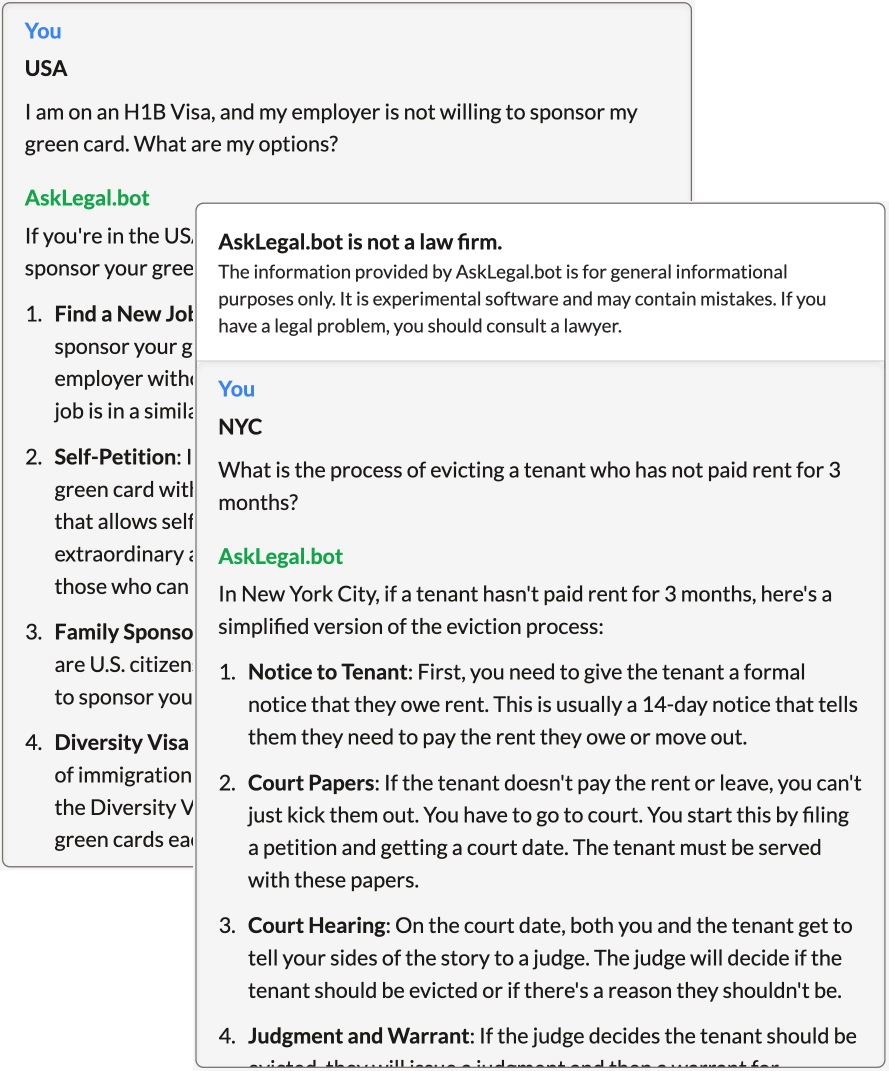
Legal sentiment analysis
Sentiment analysis for legal texts involves using AI to evaluate the emotional tone and opinions expressed in legal documents. It works by analyzing language patterns to identify sentiments such as positivity, negativity, or neutrality. With sentiment analysis, law professionals can:
- Understand emotional tone that reveals how parties or judges feel about specific issues, providing insight into case dynamics.
- Detect potential biases in judicial or legal opinions, aiding in case strategy adjustments.
- Tailor their arguments based on emotional insights and trends.
Jury selection analysis
Jury selection analysis uses AI to assess potential jurors’ backgrounds and biases through data like social media activity and demographic information. This process can help:
- Improve jury fit by selecting jurors more likely to be favorable to the case strategy
- Identify potential biases or prejudices that could influence a juror’s judgment
- Predict how jurors might respond to case elements
- Optimize case strategy by crafting arguments and strategies based on juror profiles and tendencies.
What are leading legal AI software?
Legal AI software, also referred to as AI legal assistants, leverages generative AI tools and other large language models to automate routine tasks, allowing legal professionals in law firms and the broader legal industry to concentrate on more complex legal issues.
Legal AI tools can be categorized into:
- Legal AI platforms, which are comprehensive tools delivering all core features for the legal profession, such as: Cecilia AI by Disco and Harvey AI.
- Contract drafters, which utilize artificial intelligence to create legal documents, saving time and effort for legal professional, such as: Law ChatGPT and DoNotPay.
- Legal research assistants, which analyze case law and hundreds of legal cases to find similar precedents based on key factors and outcomes, aiding lawyers in their analysis, such as: Vincent AI by vLex and Casetext’s CoCounsel.
- Legal AI chatbots, which are conversational agents powered by large language models that interact with users, answer legal questions, provide guidance, and automate various legal services, improving client service and streamlining routine legal processes, such as: Smith AI and Spellbook.
- Contract reviewers, which assist law firms with contract analysis and legal document review, significantly contributing to time saved through the use of this new technology, such as: EverLaw and LawGeex.
Compare top 15+ Legal AI software that represent the future of the legal profession.
How is the interest in legal AI?
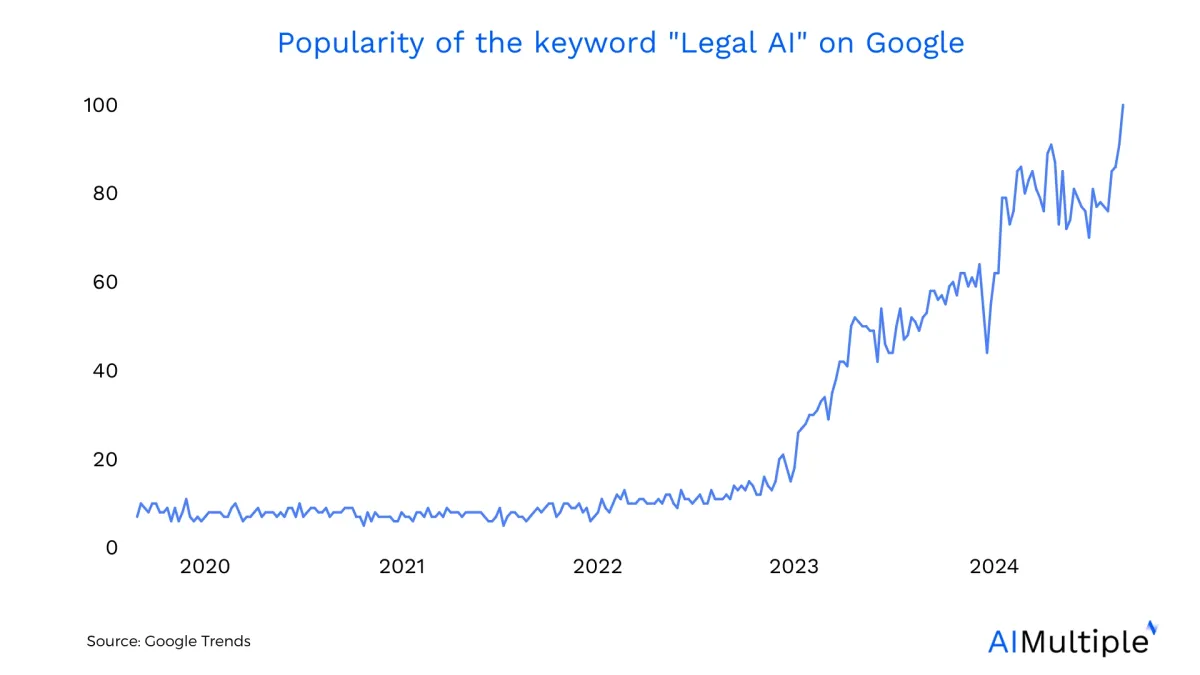
We observe increasing popularity in legal AI since mid 2023, according to Google Trends. We witness a similar trend in the legal AI market. The latest stats show us that:
- In 2019, the legal AI software market is expected to grow from $0.3 billion to $1.2 billion by 2024 at a Compound Annual Growth Rate (CAGR) of 31% during the forecast period.
This interest results from benefits due to generative AI finance applications, like:
- 84% of lawyers state that generative AI tools can increase efficiency in the legal sector.12
- Generative AI can automate 44% of tasks in the legal industry so 40% of legal firms and professionals are already experimenting with this technology.13
What are the main challenges of legal AI?
We can provide two critical challenges of AI for legal business functions:
AI can give biased predictions
AI might give biased results while forecasting court outcomes. While computing forecasts, AI bots can take irrelevant characteristics into account and provide inaccurate predictions to legal departments. This might cause companies to calculate the riskiness of their cases wrong and encounter unexpected situations.
AI might not be able to follow up changing regulations
Regulations change continuously, and AI bots need to stay up to date for legal use cases. An outdated legal AI solution can make inaccurate predictions and lead companies to wrong conclusions. As new regulations are passed every day, and existing ones change, it is a challenge to follow these regulations for legal AI tools.
You can also check our sortable and filterable lists of:
What is legal tech?
Legal tech, or legal technology, refers to the use of technology solutions to improve the efficiency and productivity of law firms and legal professionals. It includes a wide range of software systems designed to automate tasks, streamline operations, and enhance client service.
Legal tech tools can transform various aspects of legal practice, from document management to client communication, helping attorneys save time and reduce costs.
Legal tech vs. Legal AI
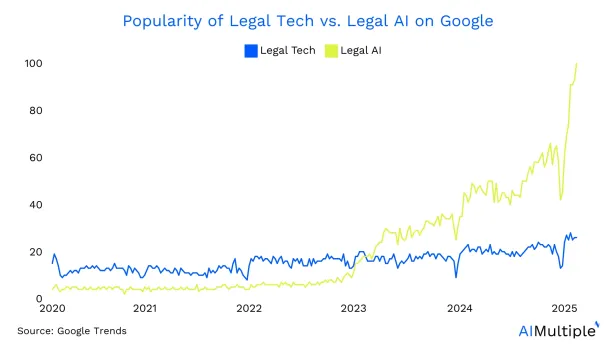
Legal AI is a subset of legal tech that uses artificial intelligence to analyze data, predict outcomes, and assist decision-making, automating tasks like contract review and case prediction. Unlike traditional legal tech, which focuses on document storage or task management, legal AI mimics human reasoning to enhance accuracy, efficiency, and decision-making.
Legal AI has been gaining more attention from the public, as evidenced by the drastic increase in Google search volume for legal AI over legal tech since 2023.
Legal tech use cases
Legal tech has a broad range of applications, each designed to address specific challenges faced by legal teams. Below are some use cases where legal technology plays a crucial role:
Case Management
Law firms often struggle with managing a large volume of client data and case files, leading to inefficiencies and errors. Legal software systems can help organize case details in a centralized location, allowing legal teams to access documents, track deadlines, and monitor progress.
These systems streamline workflows, reducing the risk of missed deadlines and ensuring important documents are easily accessible. This increases efficiency across the entire firm.
Real-life example
Search Acumen faced challenges managing a confidential redevelopment project with 1,000 individual titles, requiring weeks of manual mapping and data collation. They adopted legal tech tools to map their cases. As a result, Search Acumen achieved:
- Reduced mapping time from 6-8 weeks to just minutes
- Swift plotting of titles and easy identification of ownership issues
- Seamless collaboration among teams, clients, and law firms
- Enhanced project insights with the integration of the Data Snapshot report
- Efficient project progression without delays.14
Document automation
Legal professionals often create similar documents, like contracts and client agreements, which can be time-consuming to draft. Document automation platforms, like HotDocs or Contract Express, offer pre-built templates and workflows, speeding up the drafting process. By automating repetitive tasks, these tools free up lawyers to focus on more valuable work, such as providing legal advice or strategizing for clients.
Real-life example
Omnia Group struggled to track and manage the ever-changing laws across 44 sites. They adopted a legal register solution for compliance and efficiency. As a result, Omnia achieved:
- Streamlined compliance tracking
- Instant notifications on legal updates
- Easier regulation interpretation.
- Ensure legal obligations met efficiently across all sites.15
Legal Research
Legal research can be time-consuming, especially with large databases of case law and regulations. AI-powered tools like Westlaw and LexisNexis help lawyers search, analyze, and summarize legal information efficiently. By quickly providing relevant case law, these tools reduce research time and enhance the quality of legal work.
Real-life example
Pacific Links Foundation fought for reparations for the families of 39 Vietnamese victims of human trafficking, known as the “Essex 39.” This case required legal research to navigate laws across four jurisdictions (Vietnam, UK, Belgium, France) and case management to coordinate legal proceedings. As a result, the tool enabled firm to achieve:
- 3 landmark decisions across 4 jurisdictions
- Compensation awarded to victims’ families in Belgium and France
- Ensure asset confiscation and reparations from traffickers
- Set a precedent for future human trafficking compensation cases
- Estimate 49 million victims trafficked annually. 16
Billing and Invoicing
Billing can be complex for law firms, especially with fluctuating hours and varying fee structures. Billing and tracking software such as TimeSolv helps law firms track billable hours, generate invoices, and manage payments. These systems improve accuracy, reduce errors, and ensure timely payments, which increases efficiency in the firm’s administrative processes.
Real-life example
Tom Kirkendall, a solo attorney in Texas, has been struggling with the inefficiency of its billing process. After adopting a user-friendly tool, Tom achieved:
- Migration process completed
- Streamlined billing and time tracking process with one system
- Improved cash flow with trust accounting and online client payments
- Increased efficiency in time and billing tasks with minimal downtime.17
Legal tech benefits
The benefits of legal tech are substantial. It helps many lawyers perform routine tasks faster and more accurately. For instance, legal research tools can provide quicker answers, reducing the time spent on case law searches. Similarly, document automation tools eliminate the need for repetitive manual drafting, freeing up lawyers to focus on more complex work.
Legal tech also improves client service by enabling seamless communication and providing clients with greater transparency through online portals. Ultimately, these tools increase efficiency by automating time-consuming tasks and helping legal teams stay organized.
Further reading
Now that you have checked out AI applications in the legal business functions, please check out other AI applications in marketing, sales, customer service, healthcare, insurance, or analytics. You can also read our other articles about AI and legal functions:
- Ultimate Guide to Artificial Intelligence (AI)
- 100+ AI Use Cases & Applications
- AI in Business: Guide to Transforming Your Company
- Ultimate Guide to the State of AI Technology
- Advantages of AI according to top practitioners
- Future of AI according to top AI experts
- Legal Document / Contract Automation: In-depth Guide
If you have more questions, do not hesitate to contact us:
External sources
- 1. Legal AI Software Market Size, Share, Trends, Revenue Forecast & Opportunities | MarketsandMarkets™.
- 2. What is Document Automation and How Does it Work?.
- 3. How Earthly Simplified Contracts & Cut Legal Costs.
- 4. Streamline Contract Review with AI Precision | ThoughtRiver.
- 5. PILOT: Legal Case Outcome Prediction with Case Law.
- 6. Outreach Corporation - Lexion Case Study.
- 7. CoCounsel: One GenAI assistant for professionals | Thomson Reuters.
- 8. Kyocera Document Solutions Inc. Selects Anaqua for Integrated IP Management - Anaqua IP Management Software and Services. Anaqua IP Management Software and Services
- 9. Eversheds Sutherland | OpenText.
- 10. How Lufthansa Controlled Legal Costs and Created an Immediate ROI. Brightflag
- 11. AskLegal.bot | AI Legal Help.
- 12. 50 must-know legal tech stats for 2024 | LexisNexis Blogs . LexisNexis
- 13. Briggs, Kodnani and et. al (March 2023). “The Potentially Large Effects of Artificial Intelligence on Economic Growth.” Global Economics Analyst. Accessed at April 17, 2024.
- 14. Transforming Project Management Through Technological Advancements - Search Acumen. Search Acumen
- 15. “Libryo Case Studies.” Libryo Library. Revisited at February 21, 2025.
- 16. Granting victims of human trafficking access to compensation.
- 17. Tom Kirkendall. TimeSolv

Comments
Your email address will not be published. All fields are required.